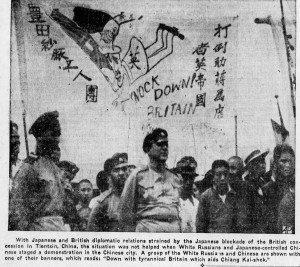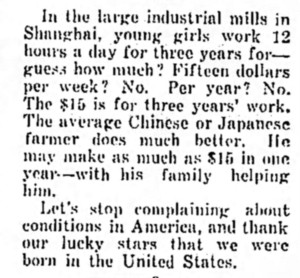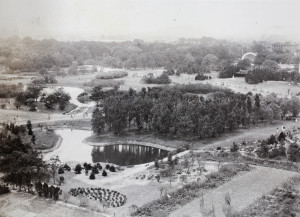Posted: July 9th, 2015 | No Comments »
This picture from July 1939 is interesting – while Japanese anti-British demonstrations were a bit of a way of life in Shanghai and Tientsin after the war started in ’37, this picture shows the involvement in a demonstration of Chinese living within the Japanese concession (perhaps coerced, paid to attend?) and White Russian activists (probably in the pay of the Japanese or part of one of the various pro-fascist White Russian grouplets) – the slogan says “Knock Down Britain”. The primary gripe seems to be Britain’s support for Chiang Kai-shek and the Nationalists against the Japanese. Quite what uniform the White Russian is wearing is somewhat lost on me?

Posted: July 8th, 2015 | No Comments »
“It is not history, but it is a hoot”, one reviewer wrote – and quite true. Sky Atlantic’s Fleming (which has been around for a while but I only just round to seeing it) was great fun. If there are one or two people from the twentieth century it would be excellent to be then Ian Fleming must be one of them – topped only perhaps (and certainly so for all China Rhymers) by his older brother Peter.
So it would be remiss of me not to note the presence of China sojourner, explorer and commentator Peter Fleming (the older brother, played by Dominic Cooper) in the show. Of course for many years, before the war, Peter was the Fleming everyone knew – a standard pin-up for the girl’s sixth form. His travels in China are legendary and chronicled in One’s Company and News From Tartary. Fleming starts with the two brothers travelling through Europe on a train and Peter being spotted and asked to sign a book – “ho0w are you?” asks his female admirer to which, Peter (played by Rupert Evans) utters the (to China Rhymers anyway) immortal line,”I’m just back from Manchuria.”
It is also true, as mentioned in the programme, that Ian Fleming was about to be offered the post of Shanghai correspondent for Reuters in 1939 after he resigned from the Berlin post. He didn’t take the job. In the programme he gives his reason as being that “the salary wouldn’t have even covered my opium bill.” A good line but I’m not sure it’s got any basis in history.
Peter comes over as a bit of a mummy’s boy and the less eccentric, less anti-authoritarian brother. I’m not sure how accurate that is either, but the show’s about Ian so plays up his playboy creds. Still, Peter traveled through Brazil, Russia and China and had plenty of adventures as well as marrying a movie star (Celia Johnson). However, if you believe the achingly funny portrayal of Peter in Auden & Isherwood’s 1939 Journey to a War then perhaps there’s some truth in it.
BTW: there’s a profile of Peter Fleming here that I wrote for the Audible audiobooks website some time back…..

Dominic Cooper as Ian Fleming

Rupert Evans as Peter Fleming

The real Peter in uniform
Posted: July 7th, 2015 | No Comments »
Just how much did the factory girls of 1939 Shanghai earn? Amazingly just $15 for three years work!….

Posted: July 6th, 2015 | No Comments »
Robert Nield’s China’s Foreign Places – now out and highly recommended as a history of the treaty ports…

During the nineteenth and early twentieth centuries, the imperial powers–principally Britain, the United States, Russia, France, Germany and Japan–signed treaties with China to secure trading, residence and other rights in cities on the coast, along important rivers, and in remote places further inland. The largest of them–the great treaty ports of Shanghai and Tientsin–became modern cities of international importance, centres of cultural exchange and safe havens for Chinese who sought to subvert the Qing government. They are also lasting symbols of the uninvited and often violent incursions by foreign powers during China’s century of weakness. The extraterritorial privileges that underpinned the treaty ports were abolished in 1943–a time when much of the treaty port world was under Japanese occupation. China’s Foreign Places provides a historical account of the hundred or more major foreign settlements that appeared in China during the period 1840 to 1943. Most of the entries are about treaty ports, large and small, but the book also includes colonies, leased territories, resorts and illicit centres of trade. Information has been drawn from a wide range of sources and entries are arranged alphabetically with extensive illustrations and maps. China’s Foreign Places is both a unique work of reference, essential for scholars of this period and travellers to modern China. It is also a fascinating account of the people, institutions and businesses that inhabited China’s treaty port world.
Posted: July 5th, 2015 | No Comments »
On the last day of 1940 these Chinese women attempted suicide by jumping into the Whangpoo River (Huangpu River) tied together. Passersby pulled them out and they did not drown. The newspaper speculated that the harsh life in Shanghai since the 1937 Japanese invasion was probably to blame – and maybe it was (stagflation, hunger, shortages, unemployment, dislocation, death, disease – take your pick?) but maybe they had another story…who knows! It’s certainly quite a haunting picture.

Posted: July 4th, 2015 | No Comments »
Apparently it’s now quite traditional for Americans to have hot dog picnics on July 4th. I think the tradition started, or at least was most famously celebrated, by FDR at Hyde Park when King George VI and Queen Elizabeth visited in 1939. The tradition spread to Shanghai too with the American community holding July 4th hot dog picnics in Jessfield Park (now Zhongshan Park) – seen here in 1932….

Posted: July 3rd, 2015 | No Comments »
I’m not sure how China’s current anti-smoking laws and campaigns are going…but they’ve had a go before, back in the 1930s….Shame Xi Jinping hasn’t revived the New Life Movement tagline….

Posted: July 2nd, 2015 | No Comments »
This map is from 1932 – not much else to say really!…..except that if you click on it then it should expand….










